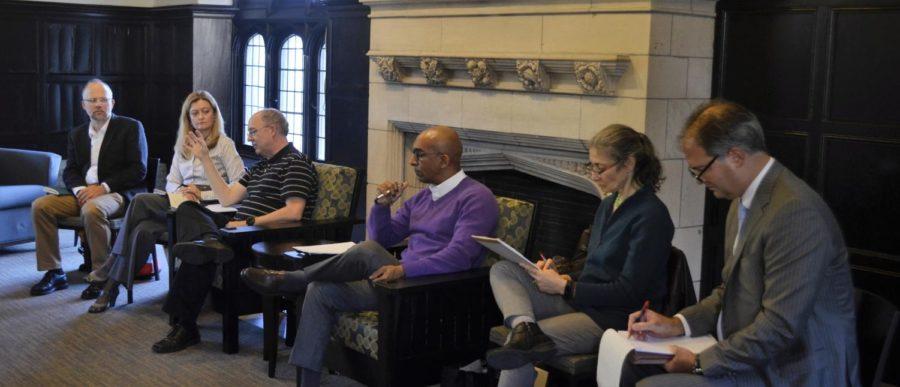The faculty committee tasked with proposing a disciplinary system for disruptive protests and other conduct that interferes with University business took student input yesterday.
The committee was created in the wake of protests last year including the occupation of Levi Hall by a group calling for increased accountability by the University and audience interruptions of speakers including Cook County Attorney General Anita Alvarez. The All-University Discipline System, which the committee is reviewing, was created after a series of protests against the Vietnam War in 1969 that led to the expulsion of 42 students through a drawn-out and contentious disciplinary process.
Committee members clarified aspects of their work so far and gave insight into their probable recommendations, including the creation of a separate disruptive conduct-specific disciplinary system similar to the one for issues of sexual misconduct.
The meeting was led by Committee Chair and Law School professor Randal Picker. Committee members Michele Rasmussen, Daniel Abebe, and Christopher Wild were also present, along with Associate Provost for Faculty Affairs Ingrid Gould and Theodore Stamatakos, a member of the University’s Office of Legal Council. Fewer than 10 people were in the audience at the event, which was held from 1:30-2:30 p.m. in the South Lounge on the second floor of the Reynolds Club.
Picker began the forum by describing the Committee on University Discipline for Disruptive Conduct’s intentions, as well as the context for its creation. Earlier precedents include the 2014 committee chaired by Law School professor David Strauss, charged with recommending the University’s response to protests related to the currently-underway Level I trauma center, and the committee led by Geoffrey Stone last year that examined the University’s broader stance on free speech.
Both previous committees concluded that the University should be committed to free speech but also has the right to restrict protesting under certain circumstances, such as when University functions could be impeded. Picker said that the current committee will recommend ways to translate the general conclusions of those two panels into actual, on-the-ground policies.
According to Picker, the committee is especially interested in dealing with situations where the free speech interests of two groups or individuals come into conflict, citing an example last year when individuals celebrating Israeli Independence Day on campus were protested by members of activist organization Students for Justice in Palestine. Picker specified that the committee is not opposed to protests, which they expect on a university campus, but do take issue with the disruption of activities.
The committee also wants to ensure that members of the University community understand the role of Deans-on-call at protests, who Picker said are intended to make sure that protestors understand the potential disciplinary consequences of their actions but often do not know the specifics of those consequences themselves. Picker also suggested the designation of individuals within activism RSOs to be sources of information on university free speech policy as a way to increase the system’s transparency.
The committee’s work is divided into two stages: Meeting with various groups to gather perspectives on the current system and how it could be altered, and making its recommendation before its deadline of December 15. Picker said that the committee is currently nearing the end of the first stage.
In response to audience questions about efforts by the University to rework or add to existing channels for students to communicate issues to the administration and potentially avoid the necessity of protests, Picker said that the committee is exclusively tasked with reviewing the discipline system, and that none of the members were aware of such a project.
Audience member Emilio Comay del Junco, a P.h.D. student who was involved in the trauma center protests, said he was worried about the vagueness of the University’s motives in creating the committee, and speculated that there may be a perception that the current system is not resulting in strong enough penalties. Comay del Junco said that proposals such as the creation of a separate disciplinary system or the enforcement of a system for organizations to register protests in advance with the administration worry him because of their potential to discourage expression. According to Comay del Junco, “It could be a serious impediment if they put much more draconian penalties on [student and community activism].”









